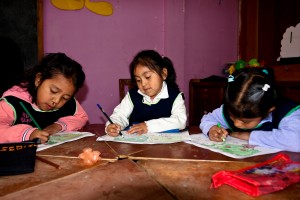
Music, art, recreation, story hour and ample personal attention all help to create an environment for growth and development in a child’s life. These constructive outlets and activities are important for all children, but can be especially beneficial for children from extremely poor families, families which lack the time and resources to provide these outlets at home.
The Center for Holistic Education and Development (CEDIN), is a Child Aid partner in Guatemala and a very special Montessori-type preschool. Children who attend CEDIN come from a diverse background, but nearly all of them come from families that are so poor they cannot afford the costs associated with sending their children to school. Thanks in part to Child Aid donors, the children at CEDIN receive scholarships and can attend the school and learn to read at an early age.
CEDIN has small classes with no more than 30 children per two teachers, meaning every child gets lots of personal attention. The teachers stay with the kids for their entire time at CEDIN so the teachers get to know the children very well. The children have the freedom to explore the world around them through songs, books, stories and games, and get to develop new skills that are important for their future growth through playing with games, acting out dramas, engaging with music and learning to draw and paint.

CEDIN looks like a fun place, and it is. But the personal stories that come with the child are not always fun. For example, Ivan is five years old and has faced incredible hardships at home. When Ivan came to CEDIN he was every bit the young rebel, letting out his inner frustrations by disrupting class, and at times even yelling at or threatening the other students and teachers. But because of CEDIN’s high teacher-student ratio and the methods of teaching, Ivan got a lot of positive attention. He was exposed to many constructive activities that enabled him to channel his emotions. He even had access to a psychologist, who has been able to coach the teachers on how to help Ivan channel his destructive behavior into constructive actions.
After a year and half in CEDIN, all the teachers and the psychologist conclude that Ivan is better adjusted. He has fun and gets along with his classmates. He no longer argues with the teachers, and he eagerly participates in new activities. While Ivan’s home life remains difficult, he has found a refuge and a place of growth and development in CEDIN, and this will help him succeed in school in the years to come. Without CEDIN, Ivan would never learn to read, wouldn’t be in school and would likely have no chance at a future beyond one of extreme poverty.